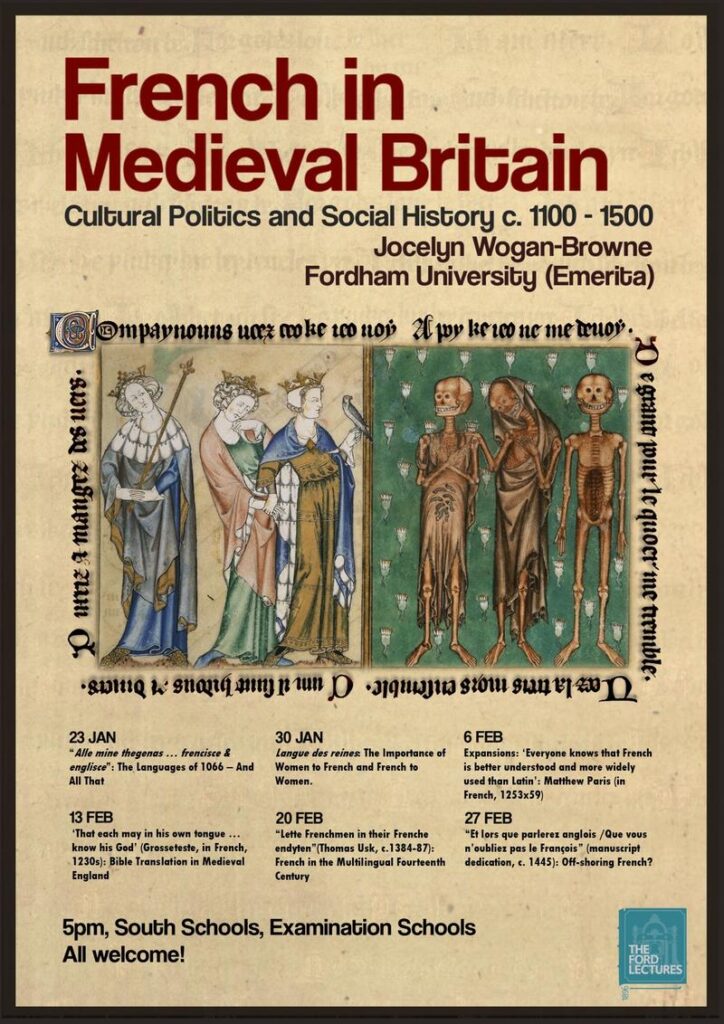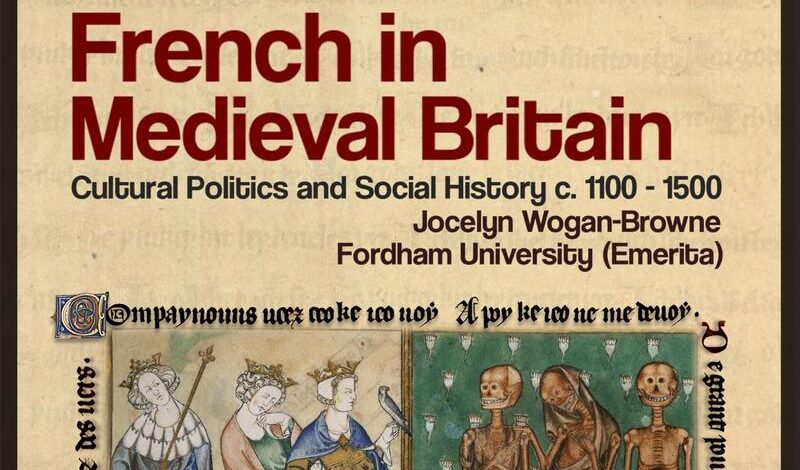Jocelyn Wogan-Browne on Cultural Politics and Social History, c. 1100-c. 1500
Thursdays at 5pm, Weeks 1-6 Hilary, Examination Schools
French played a major, though not the only role, in the pervasive multilingualism of British history and culture. As Britain’s only medieval ‘global’ vernacular, it was also important to a wide range of people for their participation in external theatres of empire, trade, culture, conflict, and crusade. Displacing the long shadow of nineteenth-century nationalizing conceptions of language and their entrenchment in modern university disciplinary divisions, emerging histories of French in England and increasingly of French in Ireland, Wales, and Scotland offer new ways of understanding language and identity. These lectures trace francophone medieval Britain in a chronological sequence across its four main centuries, interpolating two thematic lectures on areas especially needing integration into our histories, medieval women and French in Britain, and French Bible translation in medieval England.
About the Lecture Series: The Ford Lectures in British History were founded by a bequest from James Ford, and inaugurated by S.R.Gardiner in 1896-7. Since then, an annual series has been delivered over six weeks in Hilary term. They have long been established as the most prestigious series in Oxford and an important annual event in the University’s calendar.

About the speaker: Professor Jocelyn Wogan-Browne is Professor emerita of both the University of York, where she held the Chair of Medieval Literature from 2005 to 2010, and Fordham University in New York, where she was the Thomas F.X. and Theresa Mullarkey Chair in Literature from 2010 to 2019.
Her wide-ranging scholarship has most recently focused on the reconceptualization of English medieval literary culture as a multilingual community. She has created a fundamentally new understanding of the importance attached to knowing, speaking, reading and/or writing French in later medieval England: work on the culture of late medieval England is now unthinkable without taking her insights into account. The approach was spearheaded in her Vernacular Literary Theory from the French of Medieval England: Texts and Translation (with Thelma Fenster and Delbert Russell) (Cambridge, D. S. Brewer, 2016), which built on the earlier The Idea of the Vernacular: Middle English Literary Theory c. 1280-1520, with Nicholas Watson, Andrew Taylor, and Ruth Evans. A book of essays, The French of Medieval England: Essays in Honour of Jocelyn Wogan-Browne (2017), speaks to the extensive influence of her work and the esteem in which she is held by the scholarly community.
Jocelyn came to Oxford from Australia to study for the BPhil in Medieval Language and Literature at St Hilda’s College under the supervision of Elspeth Kennedy, one of Oxford’s most inspirational teachers. Her fellow countryman, Bruce Mitchell, another medievalist, became her mentor, and she became established in Oxford at the events he hosted for students from the southern hemisphere. Jocelyn started a DPhil in Old Norse and Old French, but accepted a lectureship in Early Middle English and Anglo-Norman at Liverpool, later receiving a doctorate on the strength of her numerous publications. Liverpool was followed by positions at York and Fordham, where her dedication to students and teaching won her a basket of teaching awards, in addition to her distinguished research profile.
Now living in Oxford and a member of St Edmund Hall, Jocelyn Wogan-Browne remains a dynamo of multi-disciplinary research. Her Ford Lectures will undoubtedly turn our concept of ‘English History’ on its head.
Lecture Schedule
30th Jan: Langue des reines: The Importance of Women to French and French to Women.
Thursdays at 5pm, Weeks 1-6 Hilary, Examination Schools
More information can be found here: https://www.history.ox.ac.uk/james-ford-lectures-british-history

